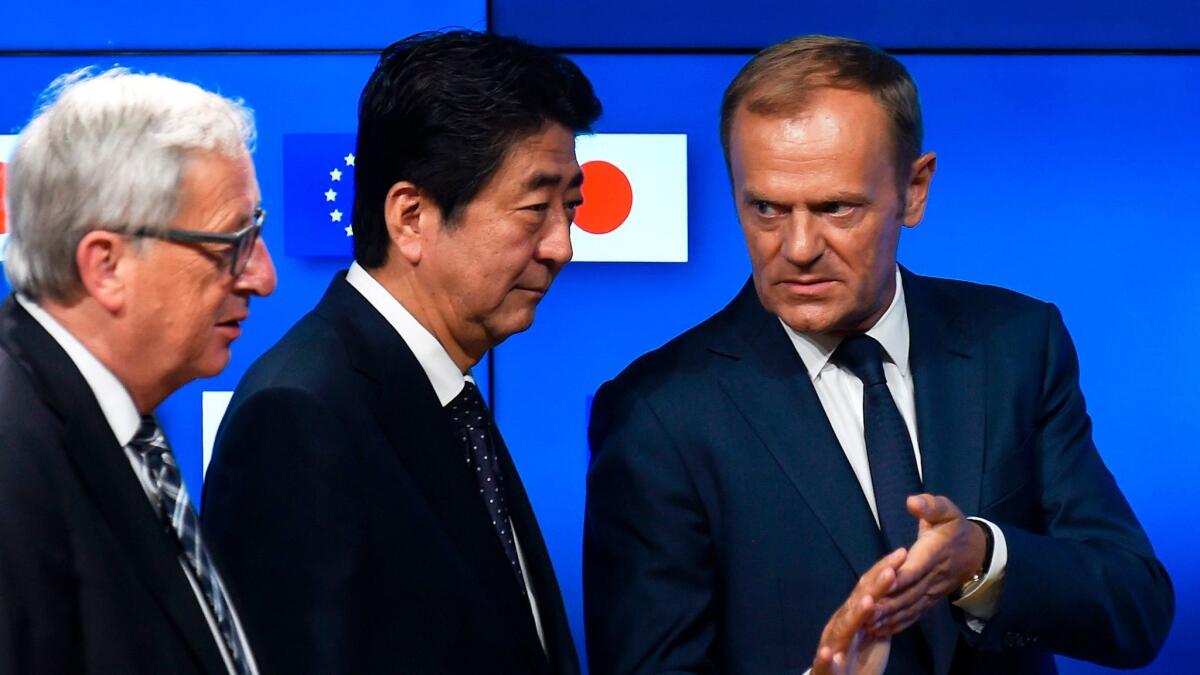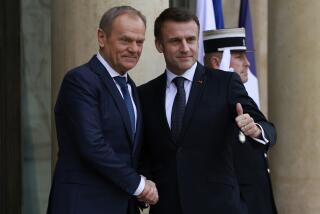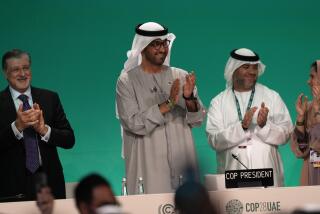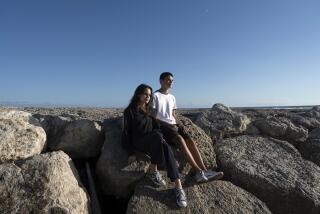Europe’s leaders stepping into bigger role on global trade and climate change

When President Trump visited a NATO meeting and a Group of 7 summit on his first trip abroad as U.S. leader in May, some European leaders hesitated to say too much about his controversial views on such issues as trade, immigration and the environment.
But two months later, they appear more willing to make moves with or without affirmation from the U.S.
On Thursday, European Commission President Jean-Claude Juncker and European Council President Donald Tusk announced a sweeping free trade agreement between the 28-nation European Union and Japan. When he took office in January, Trump canceled the Trans-Pacific Partnership, President Obama’s free trade agreement with 11 Pacific Rim countries.
The European Union has become a “global point of reference” on issues as diverse as climate change and terrorism, Juncker and Tusk said this week.
Among leaders attending the Group of 20 summit of industrialized nations in Hamburg, Juncker and Tusk aren’t the only ones who see Trump’s recent rejection of the Paris agreement on climate change — which sets a cap on emissions thought to cause global warming — and multi-country free trade agreements as a chance for the continent to lead on those issues.
“While we seek chances to cooperate for everyone’s benefit, globalization is seen in the American administration as a process which isn’t about win-win situations but about winners and losers,” German Chancellor Angela Merkel said in an interview published Wednesday in the newspaper Die Zeit.
She told the German Parliament last week that it would be “delusional” if any leaders avoid working with other countries on global issues such as climate change and trade, which will be in focus during the leaders’ discussions on Friday and Saturday in Hamburg.
Merkel, who will lead the summit, has emerged as an advocate for globalization and free trade.
She has been more outspoken than most of her counterparts from other European countries. Her relationship with Trump quickly became fraught after he publicly criticized Germany’s trade surplus this year and threatened to slap tariffs on German cars that are imported to the U.S.
Merkel and Trump met in Hamburg on Thursday. A German government spokesman said they discussed North Korea, the Middle East and the conflict in eastern Ukraine during their hourlong meeting in a hotel. German Foreign Minister Sigmar Gabriel and U.S. Secretary of State Rex Tillerson were also at the meeting.
“We already know his different approach, we know what he’s said, we know the uncertainty it has created,” said Norbert Roettgen, a German member of Parliament from Merkel’s Christian Democratic Union party.
“Some European member states don’t believe anymore that Trump can redeem himself. They think there is not much to expect. Others might not expect much either but are not ready to play the America bashing game,” said Pierre Vimont, an analyst at the Brussels-based think tank Carnegie Europe who was previously a French ambassador to the U.S.
But Trump’s visit has highlighted fault lines dividing European countries, with Poland hosting him before the G-20 summit. Polish politicians touted the visit as a sign that the two countries have especially strong ties.
Ahead of Trump’s one-on-one meeting with Russian President Vladimir Putin during the G-20 summit on Friday, Eastern European countries were especially worried that any agreement between the two leaders could stir tension in the region.
Thousands of protesters marched in Hamburg on Thursday, calling for G-20 leaders to address such issues as climate change and economic problems worldwide. Authorities used water cannons to disperse some protesters who police said threw bottles and other objects.
Trump will return to Europe next week for a World War I anniversary ceremony with French President Emmanuel Macron, who recently advertised his own spin on Trump’s campaign slogan: Even without the U.S. involved, the Paris climate agreement will “make our planet great again,” Macron said in an official video.
It was only days after returning from Europe in May that Trump announced he would take the U.S. out of the Paris agreement. European leaders have lined up to voice their disappointment in Trump’s decision.
“To some extent this second visit is a way of finding out if Trump is really sticking to his line or showing any opening” on cooperating on trade and environmental agreements, Vimont said.
Leaders are expected to sign off on a new climate action plan on emissions during the summit. They are also set to discuss a list of growing political crises, including North Korea’s missile tests.
Stupp is a special correspondent.
UPDATES:
2:45 p.m.: This article was updated with information on protests.
10:45 a.m.: This article was updated with information about the meeting between German Chancellor Angela Merkel and President Trump.
This article was originally published at 9:55 a.m.
More to Read
Start your day right
Sign up for Essential California for news, features and recommendations from the L.A. Times and beyond in your inbox six days a week.
You may occasionally receive promotional content from the Los Angeles Times.






